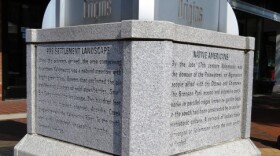A city with wealthy philanthropists where families who started successful business have chosen to stay and donate their money to causes to make it a better community. That describes both Kalamazoo and Grand Rapids.
Researchers at Grand Valley State University have released a new report on the philanthropic character of both towns. WMUK’s Gordon Evans spoke with Grand Valley Political Science Professor Michelle Miller-Adams (who is also a Research Fellow at the Upjohn Institute for Employment Research in Kalamazoo) and Michael Moody, the Frey Foundation Chair for Family Philanthropy at GVSU’s Dorothy A. Johnson Center for Family Philanthropy.
Moody describes both Kalamazoo and Grand Rapids as proud philanthropic communities where philanthropy is present and important in both places. But there are differences in how philanthropy is practiced in both communities.
For instance, donors in Kalamazoo are more likely to remain anonymous. Miller-Adams some donors want to stay out of the “nitty gritty” and avoid discussions of conflicts of interest. Miller-Adams has studied the Kalamazoo Promise extensively, and says by remaining anonymous, the Promise donors essentially invited community to step up and play a role.
But a name on a building might be there because the recipient wanted it, not the donor. Moody says the ego of some donors leads to the naming of a new facility. But he says often the organization receiving the donation uses a prominent name to build support from other donors.
Another key difference between Kalamazoo and Grand Rapids is the “donor coordination” on major projects. Miller-Adams describes Grand Rapids philanthropy as “highly efficient.” She says donors work together in an overt manner, while giving in Kalamazoo is often “under the radar”. Moody says the reason may be that Grand Rapids discovered public coordination among donors works. He says they had success with the convention center and Van Andel Arena in Grand Rapids, and used it on other major projects.
Even though the Upjohn Company no longer exists (it merged with Pharmacia, which was then bought by Pfizer) Miller-Adams says its legacy is very important to philanthropy in Kalamazoo. The Kalamazoo Community Foundation was started with Upjohn company stock, and she says Kalamazoo’s arts and culture infrastructure can be traced back to Upjohn. There are also Upjohn heirs living in the area, who continue giving. Moody says stories of major community leaders and donors may seem like ancient history, but he says the patterns of giving endure over time.
Moody says the philanthropic character of both Grand Rapids and Kalamazoo are found in areas such as education, arts, and downtown development. He says those trends may continue with the next generation of philanthropists in both cities, but Moody says new ones could also develop. He says for example, the future of arts in Grand Rapids is likely around events like ArtPrize. The event was founded by Rick DeVos, a member of the major philanthropic family in Grand Rapids.
The report states that it was going to press just as the Foundation for Excellence was announced in Kalamazoo. Miller-Adams says the donation and foundation established to tackle a variety of issues in the city is similar to the Kalamazoo Promise. It’s designed to operate in perpetuity with wide discretion given to the city for how the money is spent. Miller-Adams says she believes the donation would have been anonymous if it had not given to a public body.







